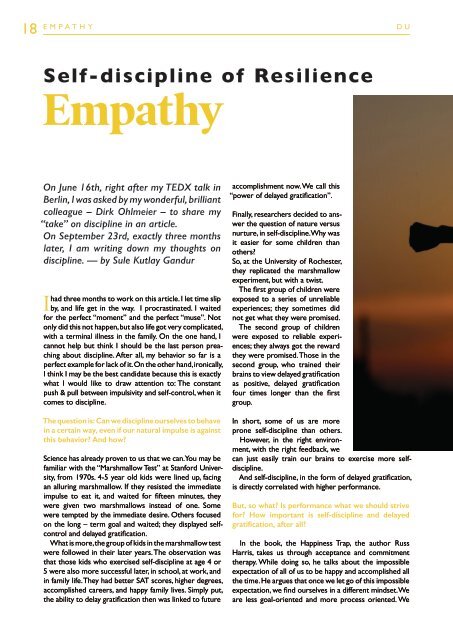Deinfaktor10.de - Disziplin
"Disziplin ist die Mutter des Erfolges" heißt es. Doch wo stehen wir eigentlich im Bezug auf Disziplin? Erfahrt aktuelle Perspektiven auf das Thema und wie die Disziplin uns aktuell vom Wachstum abhält. Interessante Impulse
"Disziplin ist die Mutter des Erfolges" heißt es. Doch wo stehen wir eigentlich im Bezug auf Disziplin? Erfahrt aktuelle Perspektiven auf das Thema und wie die Disziplin uns aktuell vom Wachstum abhält. Interessante Impulse
Sie wollen auch ein ePaper? Erhöhen Sie die Reichweite Ihrer Titel.
YUMPU macht aus Druck-PDFs automatisch weboptimierte ePaper, die Google liebt.
EMPATHY<br />
DU<br />
DU<br />
18<br />
EMPATHY<br />
19<br />
Self-discipline of Resilience<br />
Empathy<br />
On June 16th, right after my TEDX talk in<br />
Berlin, I was asked by my wonderful, brilliant<br />
colleague – Dirk Ohlmeier – to share my<br />
“take” on discipline in an article.<br />
On September 23rd, exactly three months<br />
later, I am writing down my thoughts on<br />
discipline. — by Sule Kutlay Gandur<br />
Ihad three months to work on this article. I let time slip<br />
by, and life get in the way. I procrastinated. I waited<br />
for the perfect “moment” and the perfect “muse”. Not<br />
only did this not happen, but also life got very complicated,<br />
with a terminal illness in the family. On the one hand, I<br />
cannot help but think I should be the last person preaching<br />
about discipline. After all, my behavior so far is a<br />
perfect example for lack of it. On the other hand, ironically,<br />
I think I may be the best candidate because this is exactly<br />
what I would like to draw attention to: The constant<br />
push & pull between impulsivity and self-control, when it<br />
comes to discipline.<br />
accomplishment now. We call this<br />
“power of delayed gratification”.<br />
Finally, researchers decided to answer<br />
the question of nature versus<br />
nurture, in self-discipline. Why was<br />
it easier for some children than<br />
others?<br />
So, at the University of Rochester,<br />
they replicated the marshmallow<br />
experiment, but with a twist.<br />
The first group of children were<br />
exposed to a series of unreliable<br />
experiences; they sometimes did<br />
not get what they were promised.<br />
The second group of children<br />
were exposed to reliable experiences;<br />
they always got the reward<br />
they were promised. Those in the<br />
second group, who trained their<br />
brains to view delayed gratification<br />
as positive, delayed gratification<br />
four times longer than the first<br />
group.<br />
The question is: Can we discipline ourselves to behave<br />
in a certain way, even if our natural impulse is against<br />
this behavior? And how?<br />
Science has already proven to us that we can. You may be<br />
familiar with the “Marshmallow Test” at Stanford University,<br />
from 1970s. 4-5 year old kids were lined up, facing<br />
an alluring marshmallow. If they resisted the immediate<br />
impulse to eat it, and waited for fifteen minutes, they<br />
were given two marshmallows instead of one. Some<br />
were tempted by the immediate desire. Others focused<br />
on the long – term goal and waited; they displayed selfcontrol<br />
and delayed gratification.<br />
What is more, the group of kids in the marshmallow test<br />
were followed in their later years. The observation was<br />
that those kids who exercised self-discipline at age 4 or<br />
5 were also more successful later, in school, at work, and<br />
in family life. They had better SAT scores, higher degrees,<br />
accomplished careers, and happy family lives. Simply put,<br />
the ability to delay gratification then was linked to future<br />
In short, some of us are more<br />
prone self-discipline than others.<br />
However, in the right environment,<br />
with the right feedback, we<br />
can just easily train our brains to exercise more selfdiscipline.<br />
And self-discipline, in the form of delayed gratification,<br />
is directly correlated with higher performance.<br />
But, so what? Is performance what we should strive<br />
for? How important is self-discipline and delayed<br />
gratification, after all?<br />
In the book, the Happiness Trap, the author Russ<br />
Harris, takes us through acceptance and commitment<br />
therapy. While doing so, he talks about the impossible<br />
expectation of all of us to be happy and accomplished all<br />
the time. He argues that once we let go of this impossible<br />
expectation, we find ourselves in a different mindset. We<br />
are less goal-oriented and more process oriented. We<br />
search more for competence, and less for performance.<br />
The need for success and accomplishment is replaced<br />
with a new hunger, meaning and purpose in life. Only<br />
then, we are more ready for the sudden changes and<br />
challenges life throws at us. We become resilient.<br />
Resilience is an area of interest and expertise for<br />
me, personally and professionally. I have read hundreds<br />
of books and articles on resilience. I have researched it,<br />
wrote about it, and talked about it countless times, including<br />
at TEDX Berlin. In my humble opinion, resilience, in<br />
a nutshell, boils down to this sentence by Viktor Frankl:<br />
“When we are no longer able to change a situation, we<br />
are challenged to change ourselves”. This is the philosophy<br />
of resilience. To put this philosophy into action, we<br />
need “realistic optimism”– a crude understanding of<br />
our circumstances, but also a hopeful outlook on the<br />
future. And, this takes self-discipline. As developmental<br />
psychologist Emmy Werner’s famous research proves<br />
to us, we are not born as resilient children, but we can<br />
certainly develop into resilient adults. When she studied<br />
about 800 children from birth into midlife, she found<br />
these common denominators among the resilient group.<br />
Werner called them protective factors:<br />
• Personal – ability to solve problems<br />
• Family – strong bond with a care taker<br />
• Community – helping others<br />
• Communication- empathy and connection




